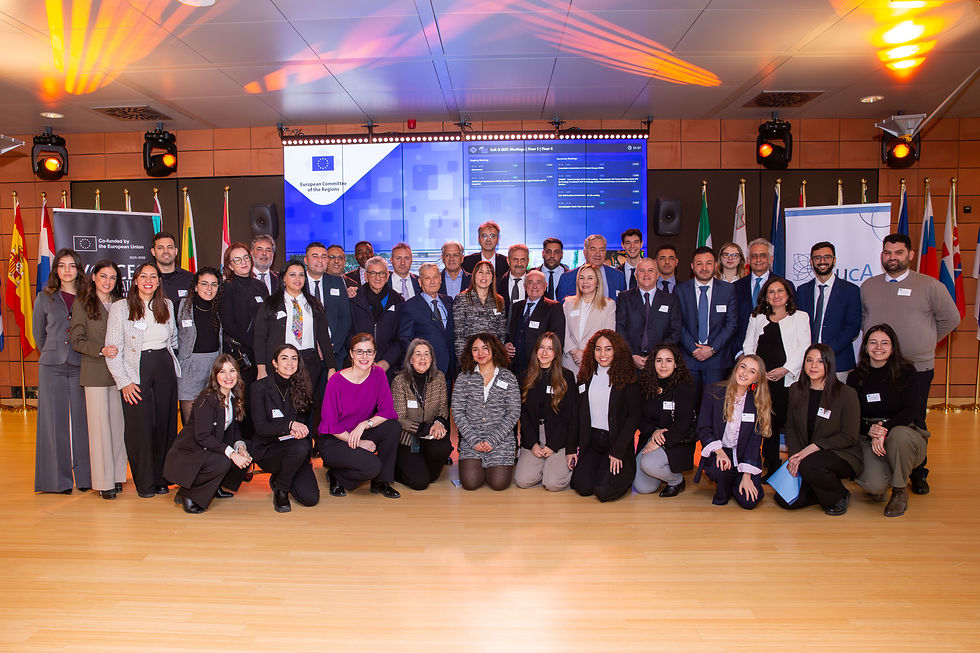VOICES From Migrations | Mariagiovanna Elleboro's story
- Changemakers
- Jul 13, 2025
- 3 min read
Updated: Aug 12, 2025
“VOICES From Migrations” is a project co-financed by the European Union that gives voice to the untold migration stories. Mariagiovanna moved from Italy to Belgium in 1972, when she was still a child. This is her story.

“My name is Mariagiovanna, I was born in 1967 in Corigliano Calabro, now Corigliano Rossano, in Calabria. I have lived in Belgium since 1972, where I arrived, as an immigrant, at the age of five. I began my studies in Belgium, and after graduating, I worked as a teacher of religion and sales techniques. I did not have the opportunity to attend an Italian school, and everything I know, I learned from my family.
I’ve never forgotten that little girl with stockings and cardboard suitcases in Milan Central station. First, there was the Calabria–Milan train. Then Milan–Charleroi–Namur. It was in that Milan Central station that I couldn't see the end. With the frightened eyes of a child, I asked myself: ‘Where are we going to end up with all these people?’. I held tightly to my mother’s dress. My sister wasn’t even two years old. I took those trains for years, to return to my homeland. Every land became mine, whether Coriglianese or Belgian. I no longer had just one land, but two.
There was one smell that lingered most on that train, the one that took us to the land of my birth. A smell that gripped you in the pit of your stomach. I wanted my children to experience that smell thirteen years ago, back when there was still that train Rome-Corigliano-Crotone. We arrived and, with our suitcases, we walked across the entire station to take the bus to the historic center of Corigliano.
I remember that the neighbors were elderly but very kind to us. We didn't know anything or anyone. My mother was helped a lot by them. In fact, shortly after, she found a job at a cement factory.
However, I would like to tell you that in the 70s, in Wallonia, there was a lot of discrimination. You could often find a sign that said: ‘We welcome dogs but not Italians’. I am very grateful to my parents because they gave me the opportunity to build a better future.”
Interview by: Hajdu Zalán, Emma Urso, Fiorella Rodríguez, Ignazio Cammilleri
Original story in Italian:
‘Mi chiamo Mariagiovanna sono nata nel 1967 a Corigliano Calabro, adesso Corigliano Rossano, in Calabria. Vivo in Belgio dal ’72 e sono arrivata, da immigrata, all’età di cinque anni. Ho iniziato i miei studi in Belgio e dopo il conseguimento della laurea ho svolto la professione di docente di religione e tecnica di vendita. Non ho avuto la possibilità di frequentare la scuola italiana e tutto quello che so, l’ho imparato dalla mia famiglia.
Non mi sono mai scordata quella fanciulla con calze e valigie di cartone alla stazione di Milano. Prima il treno Calabria-Milano, poi Milano-Charleroi Namur. Ero in quella stazione di Milano di cui non vedevo la fine. Con occhi di bambina spaventata mi chiedevo: "Ma dove andiamo a finire con tutta questa gente?". Mi tenevo il vestito di mia mamma gelosamente. Mia sorella non aveva neanche due anni. Questi treni li ho presi per anni per ritornare nella mia terra. Ogni terra era mia, che sia corianese, che sia belga. Non avevo più una sola terra, ma due.
C’era un odore insistente in quel treno che ci portava nella sola terra della mia nascita, un odore che ti prende al centro dello stomaco. Questo odore ho voluto farlo conoscere ai miei figli, tredici anni fa, quando c'era ancora quel treno di Roma–Corigliano–Crotone. Siamo arrivati e, con le nostre valigie, abbiamo attraversato tutta la stazione a piedi per poi prendere l’autobus per il centro di Corigliano.
Mi ricordo che i vicini di casa erano anziani ma molto gentili nei nostri confronti, non conoscevamo niente e nessuno. Mia mamma è stata molto aiutata da loro, infatti, poco dopo ha trovato un lavoro presso una cementeria.
Però, mi preme dirvi che negli anni ’70, in Vallonia, c’era una forte discriminazione, spesso si trovava un cartello con su scritto: “Accogliamo i cani ma non gli italiani”. Ringrazio tantissimo i miei genitori perché mi hanno dato la possibilità di costruire un futuro migliore.’
Intervista di: Hajdu Zalán, Emma Urso, Fiorella Rodríguez, Ignazio Cammilleri
Read the article in My House of European History:

Funded by the European Union. Views and opinions expressed are however those of the author(s) only and do not necessarily reflect those of the European Union or the European Education and Culture Executive Agency (EACEA). Neither the European Union nor EACEA can be held responsible for them.



Comments